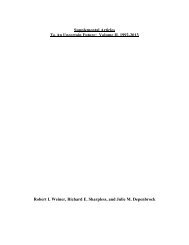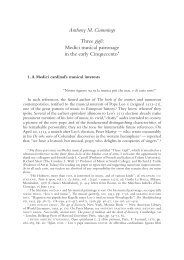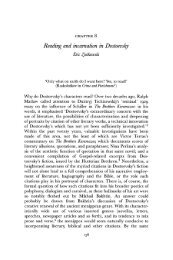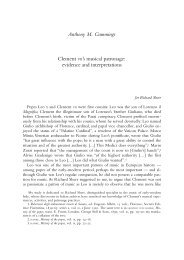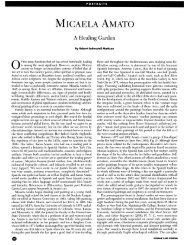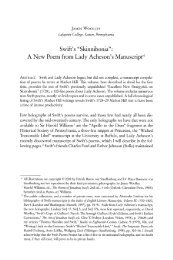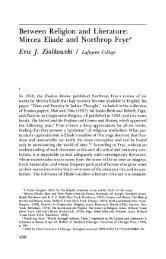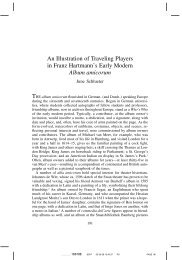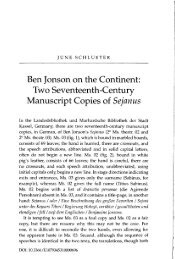courses of instruction - Lafayette College
courses of instruction - Lafayette College
courses of instruction - Lafayette College
You also want an ePaper? Increase the reach of your titles
YUMPU automatically turns print PDFs into web optimized ePapers that Google loves.
VALUES AND SCIENCE/TECHNOLOGY SEMINAR<br />
screening, human genome project, genetic<br />
discrimination, in-vitro fertilization, em<br />
bryo and fetal research, and patenting<br />
animals and plants. In addition, students<br />
evaluate social and political issues associat<br />
ed with biotechnology such as use and mis<br />
use <strong>of</strong> techniques, DNA fingerprinting, and<br />
biological warfare. Mr. Majumdar<br />
211. Oil, Politics, and the Environment.<br />
Oil plays a significant part in global econ<br />
omy, politics, and the environment. The<br />
control <strong>of</strong> the oil market has caused wars<br />
and conflicts. In addition to a brief review<br />
<strong>of</strong> the geological formation, exploration,<br />
drilling, production, and conversion <strong>of</strong> oil,<br />
this course studies the paradoxical role oil<br />
has played in shaping the economical and<br />
social structure <strong>of</strong> both exporting and in<br />
dustrial countries. The seminar considers<br />
environmental concerns related to the in<br />
crease in oil consumption and explores<br />
possible controls, remedies, and alterna<br />
tives. Mr. Tavakoli<br />
212. Values and Technology in Gothic<br />
Architecture. Students study Gothic<br />
architecture and the related arts <strong>of</strong> stained<br />
glass and sculpture as expressions <strong>of</strong><br />
medieval technology and societal values.<br />
They consider the dependence <strong>of</strong> architec<br />
tural developments on advances in medi<br />
eval structural technology and the interde<br />
pendence <strong>of</strong> societal values and techno<br />
logical progress. M r. Van Gulick<br />
213. Technology, Economics, and the<br />
Environment. This seminar examines the<br />
relationship between technology, eco<br />
nomic growth, and environmental degra<br />
dation. The seminar analyzes how im<br />
provements in human living standards<br />
resulting from technological progress af<br />
fect the environment and the welfare <strong>of</strong><br />
future generations. Students also exam<br />
ine how conflicts between human welfare<br />
and the environment are resolved. Spe<br />
cial emphasis is placed on public policies<br />
and the role they play in fostering eco<br />
nomic growth and improving the health<br />
<strong>of</strong> the environment. Prerequisite: Eco<br />
nomics 101. Mr. DeVault<br />
<br />
215. Technical Literacy. This seminar<br />
helps students understand the role tech<br />
nology plays in our society and prepares<br />
them to form their own opinions about the<br />
social, political, economic, and ethical<br />
questions associated with technological<br />
advances. Issues discussed include energy<br />
(alternative sources and conservation),<br />
genetic engineering, the environment<br />
(pollution control and prevention), and<br />
microelectronics (computers and the infor<br />
mation age). Mr. Schaffer<br />
216. Materials in Art and Technology.<br />
Materials have played a determining role<br />
in the human way <strong>of</strong> life since its begin<br />
nings, as evidenced by the time periods <strong>of</strong><br />
early progress based on the materials<br />
used the Stone, Bronze, and Iron ages.<br />
Even though not fully appreciated, it is<br />
still the case today. This seminar deals<br />
with the development <strong>of</strong> an understand<br />
ing and appreciation <strong>of</strong> basic properties <strong>of</strong><br />
materials as well as the processes used to<br />
manufacture them into useful objects. Em<br />
phasis is on the common applications <strong>of</strong><br />
materials and their use in art and technol<br />
ogy. Mr. Uz<br />
217. Darwinism: An Interdisciplinary In<br />
quiry. This seminar explores the perva<br />
sive impact <strong>of</strong> Darwinism and the concep<br />
tual order it implies on major areas <strong>of</strong> hu<br />
man thought and endeavor: biological<br />
science, literary humanism, and social sci<br />
ence. It also considers the relation <strong>of</strong> these<br />
modes <strong>of</strong> inquiry to one another and ad<br />
dresses questions about choices and val<br />
ues. Mr. Lusardi<br />
218. Technological Development in the<br />
Third World. This seminar investigates<br />
technological development within third-<br />
world countries and the necessary resourc<br />
es for sustained development, including<br />
education, natural resources, location, and<br />
population. Technological transfer from<br />
outside the third world is addressed, along<br />
with trade and international aid. The semi<br />
nar focuses on culture, governments, eco<br />
nomics, and other country-specific topics<br />
that affect technological development.<br />
Mr. Ruggles



